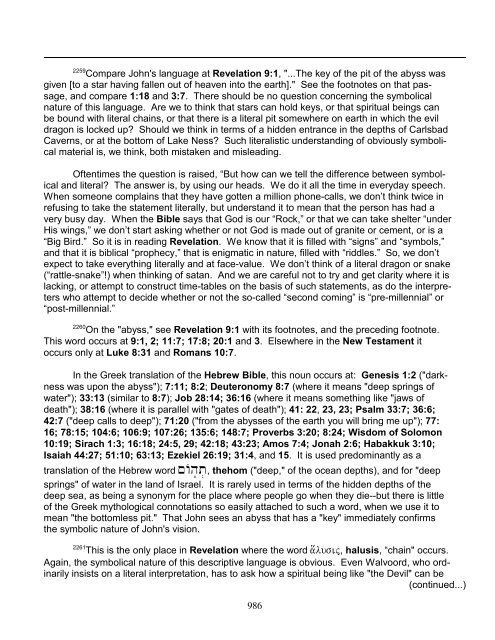Revelation 20 - In Depth Bible Commentaries
Revelation 20 - In Depth Bible Commentaries
Revelation 20 - In Depth Bible Commentaries
You also want an ePaper? Increase the reach of your titles
YUMPU automatically turns print PDFs into web optimized ePapers that Google loves.
2259<br />
Compare John's language at <strong>Revelation</strong> 9:1, "...The key of the pit of the abyss was<br />
given [to a star having fallen out of heaven into the earth]." See the footnotes on that passage,<br />
and compare 1:18 and 3:7. There should be no question concerning the symbolical<br />
nature of this language. Are we to think that stars can hold keys, or that spiritual beings can<br />
be bound with literal chains, or that there is a literal pit somewhere on earth in which the evil<br />
dragon is locked up? Should we think in terms of a hidden entrance in the depths of Carlsbad<br />
Caverns, or at the bottom of Lake Ness? Such literalistic understanding of obviously symbolical<br />
material is, we think, both mistaken and misleading.<br />
Oftentimes the question is raised, “But how can we tell the difference between symbolical<br />
and literal? The answer is, by using our heads. We do it all the time in everyday speech.<br />
When someone complains that they have gotten a million phone-calls, we don’t think twice in<br />
refusing to take the statement literally, but understand it to mean that the person has had a<br />
very busy day. When the <strong>Bible</strong> says that God is our “Rock,” or that we can take shelter “under<br />
His wings,” we don’t start asking whether or not God is made out of granite or cement, or is a<br />
“Big Bird.” So it is in reading <strong>Revelation</strong>. We know that it is filled with “signs” and “symbols,”<br />
and that it is biblical “prophecy,” that is enigmatic in nature, filled with “riddles.” So, we don’t<br />
expect to take everything literally and at face-value. We don’t think of a literal dragon or snake<br />
(“rattle-snake”!) when thinking of satan. And we are careful not to try and get clarity where it is<br />
lacking, or attempt to construct time-tables on the basis of such statements, as do the interpreters<br />
who attempt to decide whether or not the so-called “second coming” is “pre-millennial” or<br />
“post-millennial.”<br />
2260<br />
On the "abyss," see <strong>Revelation</strong> 9:1 with its footnotes, and the preceding footnote.<br />
This word occurs at 9:1, 2; 11:7; 17:8; <strong>20</strong>:1 and 3. Elsewhere in the New Testament it<br />
occurs only at Luke 8:31 and Romans 10:7.<br />
<strong>In</strong> the Greek translation of the Hebrew <strong>Bible</strong>, this noun occurs at: Genesis 1:2 ("darkness<br />
was upon the abyss"); 7:11; 8:2; Deuteronomy 8:7 (where it means "deep springs of<br />
water"); 33:13 (similar to 8:7); Job 28:14; 36:16 (where it means something like "jaws of<br />
death"); 38:16 (where it is parallel with "gates of death"); 41: 22, 23, 23; Psalm 33:7; 36:6;<br />
42:7 ("deep calls to deep"); 71:<strong>20</strong> ("from the abysses of the earth you will bring me up"); 77:<br />
16; 78:15; 104:6; 106:9; 107:26; 135:6; 148:7; Proverbs 3:<strong>20</strong>; 8:24; Wisdom of Solomon<br />
10:19; Sirach 1:3; 16:18; 24:5, 29; 42:18; 43:23; Amos 7:4; Jonah 2:6; Habakkuk 3:10;<br />
Isaiah 44:27; 51:10; 63:13; Ezekiel 26:19; 31:4, and 15. It is used predominantly as a<br />
translation of the Hebrew word ~Ah+t., thehom ("deep," of the ocean depths), and for "deep<br />
springs" of water in the land of Israel. It is rarely used in terms of the hidden depths of the<br />
deep sea, as being a synonym for the place where people go when they die--but there is little<br />
of the Greek mythological connotations so easily attached to such a word, when we use it to<br />
mean "the bottomless pit." That John sees an abyss that has a "key" immediately confirms<br />
the symbolic nature of John's vision.<br />
2261<br />
This is the only place in <strong>Revelation</strong> where the word a[lusij, halusis, “chain" occurs.<br />
Again, the symbolical nature of this descriptive language is obvious. Even Walvoord, who ordinarily<br />
insists on a literal interpretation, has to ask how a spiritual being like "the Devil" can be<br />
(continued...)<br />
986

















